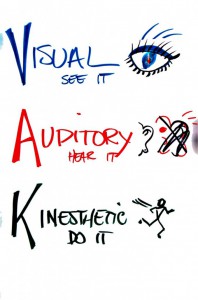Does ‘VAK’ work?


In the late fifties, early sixties, when I was a knowledge-hungry schoolboy, it was common for my class-mates and I to dip into the many do-it-yourself diagnostic tests published in the popular press – things like Eysinck’s “Test Your Own IQ”. We would then strut our self-imposed labels – and ground our emerging misconceptions about our own learning and personality styles – with all the certainty of youth. It took me quite a long time to debunk my view that “I do not have a ‘mathematical brain’”. And, perhaps my slight scepticism about diagnostics comes from the perception that I always seemed to be at the extreme poles of every continuum, and yet managed to operate in a more or less normal sort of way.
It seems to me that the importance of VAK as a ‘predictor’ of learning behaviour has gained ground recently, in the descriptors for the ‘understanding’ elements of the executive coaching and workplace coaching courses I’ve been tutoring on recently, for instance. Just like my youthful friends and I, candidates are still very happy to label themselves. “Oh, I’m a kinaesthetic learner, you know – I’ve just got to get up and move every ten minutes!”
There is some evidence from research to suggest that we all have a leaning to one, or two, of the modalities. Evidence to suggest that our learning is seriously impaired if we do not receive input in the preferred way, or to show that learning is significantly improved by a match of presentation to learning preference, is very thin on the ground. It has always seemed to me that, as learners, we just get on and use what is available at the time. We may use a preferred style to revisit the learning afterwards. It’s the same with other forms of ‘preference testing’ – I’m (perhaps) not a natural ‘completer/finisher, but, as a manager, I’ve tied up many a loose end and enforced not a few deadlines.
For me, as an educator, what is important is the way that learners seem to instinctively match a learning style, or, more often, integrate aspects of two or more, to the learning task. Why would a ‘Solution Focused’ coach expect less – the answer lies, always, with our clients. I’ve observed this ability in very young learners – adults sometimes have to regain the ability.
So, as a coach and a coach-educator, how do I respond to these musings? I don’t think it is rocket science – it may be as instinctive as the learner’s use of styles. I try to make sure that I listen for clues about how the client wants to proceed, as well as clues about goals and feelings and meaning and significance. And, I ask, frequently, what would be the best way to record our work together to achieve lasting learning support – “is this working for you?” I like to ‘latch on’ to metaphor or visualisation used by the client, and employ it to enhance our session. Having drawing paper and colouring pens, and maybe even Playdoh, in the toolkit can be useful. In presenting our courses, I’ve noticed that candidates seem to appreciate and enjoy a wide range of learning style opportunities and, from my experience, engage equally well in those that they might not have chosen as a preference.
I don’t play golf, but I’m told that, those who do, fear ‘The Yips’ – a falling off of performance associated with thinking too much about what should come naturally. Coaching, it seems to me, is every bit as much ‘skilled performance’ as golf is. I certainly welcome the richness and rigour that academic study brings to my thinking about my profession, but I would also wish to guard against reifying its paradigms and taxonomies. Contentious as it might seem, in the current climate, there’s a bit of me that approves of ‘flying by the seat of your pants’. Perhaps this is why we put so much emphasis on ‘doing, contextualising and reflecting’ on our coaching courses?






